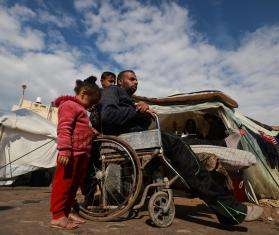SYDNEY/NEW YORK, NOVEMBER 28, 2017—The international medical humanitarian organization Doctors Without Borders/Médecins Sans Frontières (MSF) has called on Papua New Guinea to allow MSF to assess refugees' conditions and provide essential medical care in transit centers on Manus Island.
Due to Australia's policies, asylum seekers trying to reach Australia by boat are automatically sent to either Nauru or Manus Island in Papua New Guinea, where their refugee claims are determined. Even if granted refugee status, there is no option for them to be resettled in Australia. The Australian government claims this "breaks the people smuggling model."
In April 2016, the Supreme Court of Papua New Guinea ruled that the Regional Processing Center where refugee and asylum seekers were kept on Manus Island was illegal, and ordered its dismantlement. Papua New Guinea's government established transit centers instead, also on Manus Island. Yet several hundred refugees and asylum seekers did not willingly leave the Regional Processing Center when it was closed, protesting their forced removal. On October 31, 2017, the center's access to water, food, and electricity were cut, and the private medical care provider withdrew, but hundreds of people remained for weeks.
On November 19, MSF received written authorization from Papua New Guinea to assess the medical conditions of refugees and asylum seekers inside the officially closed Regional Processing Center. Accordingly, an MSF team of two doctors and a water and sanitation specialist were on standby on Manus Island starting on November 22. Yet despite receiving authorization, the MSF team was not granted access to the center.
On November 23, the MSF team met one man who was later taken by ambulance from the Regional Processing Center to Lorengau General Hospital. He appeared to be dehydrated and malnourished and showed signs of severe depression. The team was not able to speak with him at length and are now following up on his progress.
On November 24, police removed the remaining 328 refugees and asylum seekers from the Regional Processing Center and sent them to alternative transit centers. MSF was never granted access to the center and MSF has not been granted access to the transit centers on Manus Island.
Dr. Stewart Condon, the president of MSF Australia and a member of the MSF team that traveled to Manus Island, gave the following statement on November 26:
"As a humanitarian and medical professional, I am very concerned by the fate of the refugees and people seeking asylum in Manus Island's transit centers. They reportedly have had limited access to food and water for the last three weeks. Some of them have been living in detention for four years with likely impact on their mental health. MSF remains concerned about whether the medical and psychological needs of the men are being met, and whether the local structures have the capacity to care for them. The situation here is volatile and we remain on standby to give any medical humanitarian support we can."
This page has been updated. A version of this statement was released by MSF in Australia on November 26.




